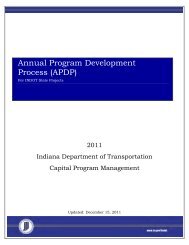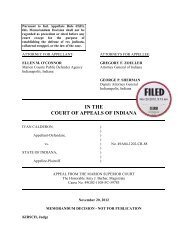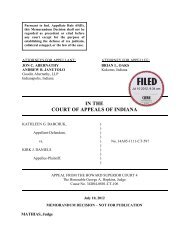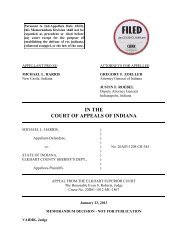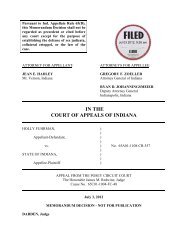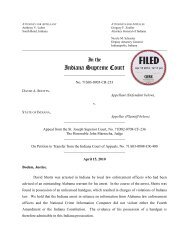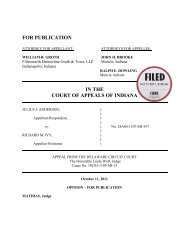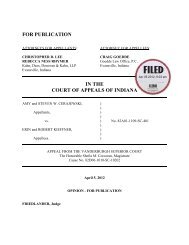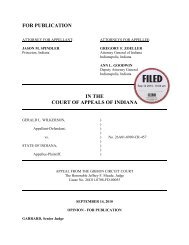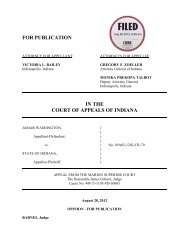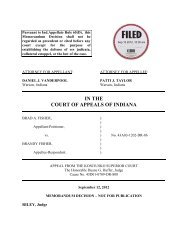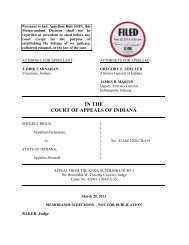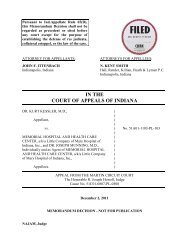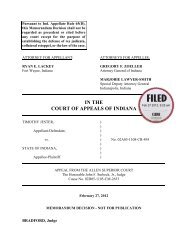Abby Allen and Walter Moore v. Clarian Health ... - State of Indiana
Abby Allen and Walter Moore v. Clarian Health ... - State of Indiana
Abby Allen and Walter Moore v. Clarian Health ... - State of Indiana
You also want an ePaper? Increase the reach of your titles
YUMPU automatically turns print PDFs into web optimized ePapers that Google loves.
We find that the decision <strong>of</strong> the Supreme Court <strong>of</strong> Tennessee in Doe v. HCA<br />
<strong>Health</strong> Services <strong>of</strong> Tennessee, Inc., 46 S.W.3d 191 (Tenn. 2001), is both directly on point<br />
<strong>and</strong> consistent with current <strong>and</strong> long-st<strong>and</strong>ing <strong>Indiana</strong> law. In that case, the court stated,<br />
in relevant part, as follows:<br />
In reviewing the hospital‟s form contract signed by Jane Doe, we<br />
note that the contract contains no express reference to a “document,<br />
transaction or other extrinsic facts” nor does it set out “a practicable<br />
method” by which Jane Doe‟s “charges” are to be determined. The contract<br />
merely states (in pertinent part): “I underst<strong>and</strong> I am financially responsible<br />
to the hospital for charges not covered by this authorization.” (Emphasis<br />
added.) HCA Donelson Hospital asserts, however, that its Charge Master is<br />
a sufficient means by which to determine Jane Doe‟s hospital charges, <strong>and</strong><br />
that the Charge Master thereby supplies a definite price term in the contract.<br />
We disagree. While it is true that the Charge Master could be used<br />
as a reference in determining a patient‟s charges, the flaw in the hospital‟s<br />
argument is that the contract itself does not “contain [ ] a reference to some<br />
document, transaction or other extrinsic facts [e.g., the Charge Master]<br />
from which its meaning may be made clear.” See Williston on Contracts, §<br />
4:27, at 593 (emphasis added). Because the agreement does not refer to a<br />
document or extrinsic facts by which the price will be determined, we hold<br />
that the price term in the agreement between Jane Doe <strong>and</strong> HCA Donelson<br />
Hospital is indefinite.<br />
In so holding, we are cognizant <strong>of</strong> the arguments <strong>of</strong> the hospital <strong>and</strong><br />
the amici curiae that invalidating the contract in dispute will wreak havoc<br />
on both the hospital industry <strong>and</strong> on non-health-care businesses alike. They<br />
argue that hospitals <strong>and</strong> other businesses commonly use contracts<br />
containing language similar to the hospital‟s use <strong>of</strong> “charges” in stating the<br />
price to be paid by the purchaser. They contend that holding this hospital<br />
contract to be indefinite could cause instability in Tennessee‟s economy<br />
because such a holding jeopardizes any contract that does not state a<br />
specific price. To be clear, the Court‟s holding in this case does not<br />
invalidate all contracts that do not state a specific price; to the contrary, our<br />
holding is based upon the particular facts <strong>of</strong> this case, i.e., that HCA<br />
Donelson Hospital‟s contract signed by Jane Doe did not provide any<br />
reference to a document, transaction or other extrinsic facts by which the<br />
price could be determined <strong>and</strong> the meaning <strong>of</strong> the term “charge” made<br />
clear. Had the agreement adequately defined “charges,” the price term <strong>of</strong><br />
the contract would not have been indefinite.<br />
14



